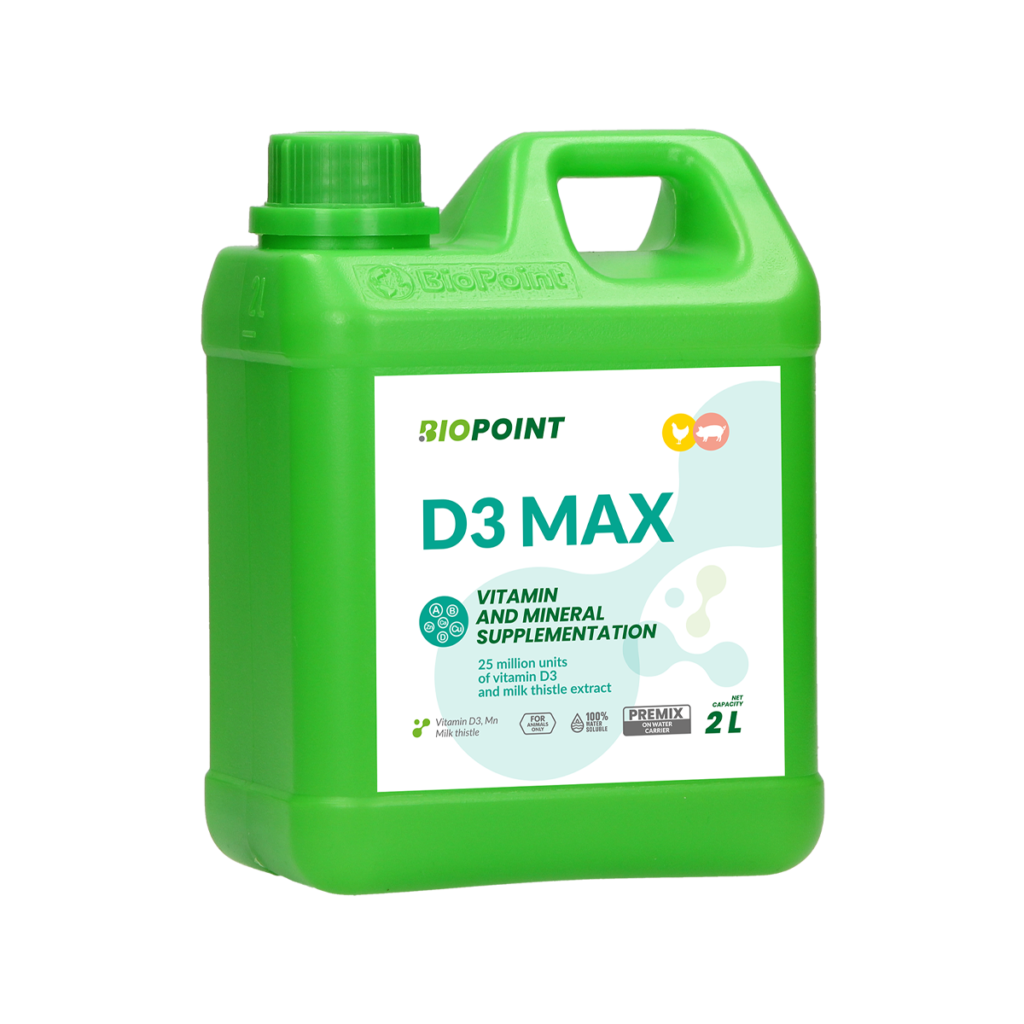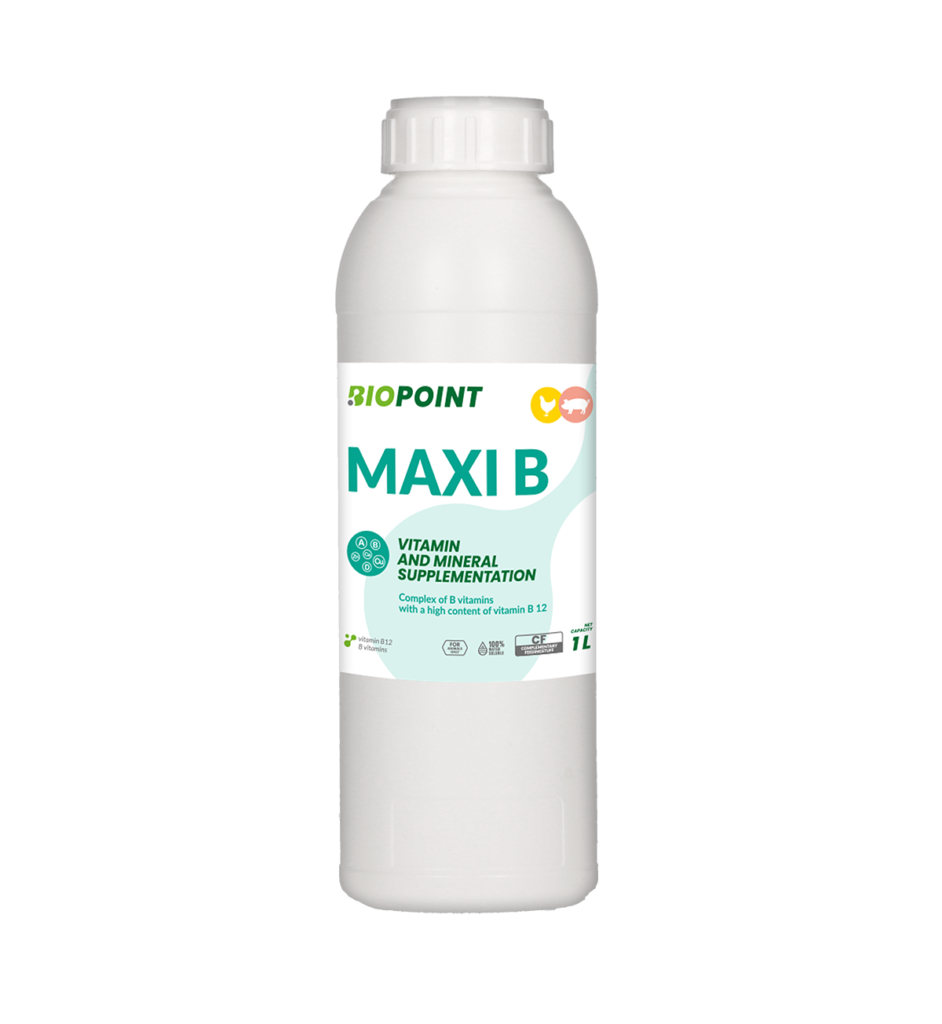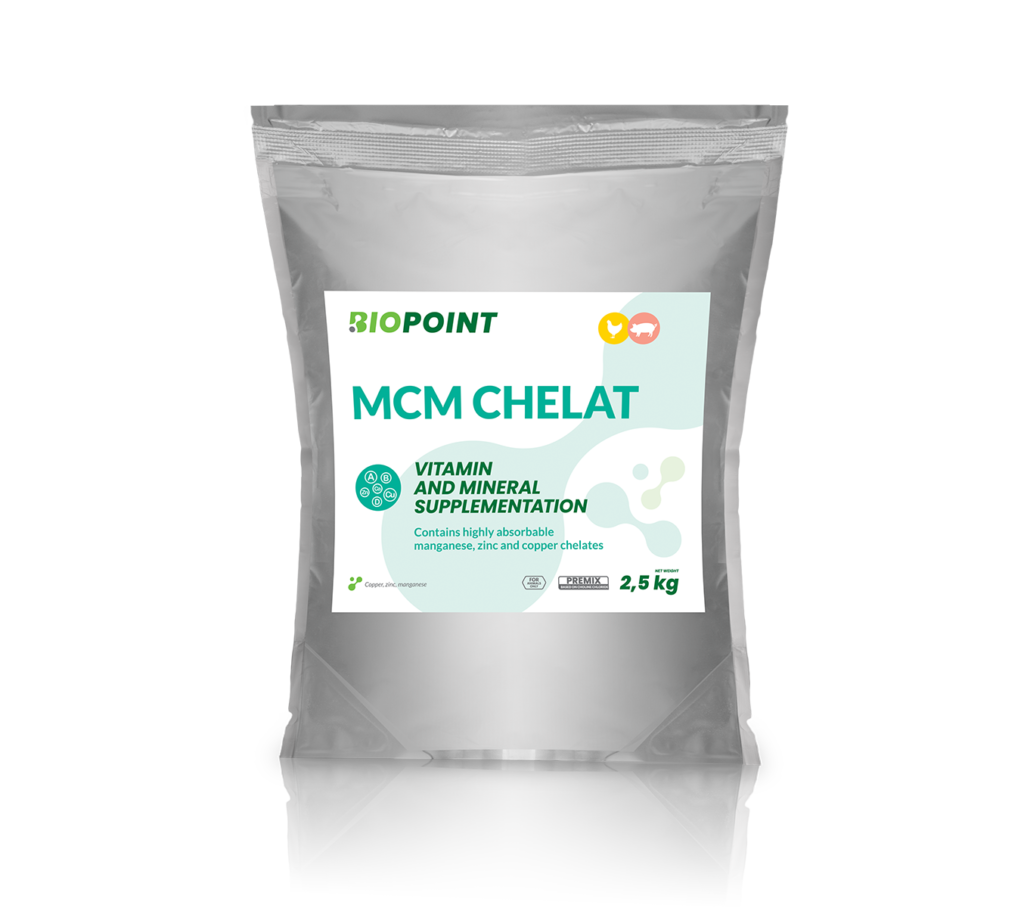
Vitamin and mineral supplementation – Pigs
D3 MAX
MAXI B
MCM CHELAT
Ask about the product
BioPoint - support for pigs - vitamin and mineral supplementation
Vitamin and mineral supplementation plays a crucial role in maintaining the health and productivity of swine. At Biopoint, we understand the importance of providing high-quality supplements to ensure the optimal growth, development, and overall well-being of livestock. Swine require a balanced diet rich in essential nutrients to support various physiological functions, including growth, reproduction, and immunity. By incorporating the right combination of vitamins and minerals into their diet, we can help prevent nutritional deficiencies and promote healthier and more resilient animals. This article explores the significance of vitamin and mineral supplementation for swine, highlighting key nutrients and their roles in maintaining swine health.
Essential Vitamins for Swine Health
Vitamins are organic compounds that are essential for the proper functioning of metabolic processes in swine. They are required in small quantities but have a significant impact on the overall health and productivity of the animals. Vitamins can be classified into fat-soluble and water-soluble categories, each with specific functions. For swine, fat-soluble vitamins such as A, D3, E, and K play critical roles in growth, bone development, reproduction, and blood clotting. Water-soluble vitamins, including the B-complex vitamins and vitamin C, are vital for energy metabolism, nerve function, and immune response. Ensuring an adequate supply of these vitamins through supplementation helps prevent deficiencies and supports optimal health and performance.
Vitamin A: Vital for Growth and Vision
Vitamin A is a fat-soluble vitamin that is essential for swine growth and vision. It plays a critical role in cell differentiation, immune function, and reproductive health. Vitamin A is necessary for the proper development of epithelial tissues, which are the protective layers covering the body surfaces and internal organs. A deficiency in vitamin A can lead to impaired growth, reproductive failures, and increased susceptibility to infections. Additionally, vitamin A is crucial for maintaining good vision, especially in low-light conditions. In swine diets, vitamin A supplementation is often necessary to ensure that the animals receive adequate amounts, as natural feed sources may not always provide sufficient levels.
Vitamin D3: Enhancing Bone Development
Vitamin D3, also known as cholecalciferol, is another essential fat-soluble vitamin that plays a pivotal role in bone development and calcium metabolism in swine. It is necessary for the absorption and utilization of calcium and phosphorus, which are critical minerals for bone formation and maintenance. Vitamin D3 helps regulate calcium levels in the blood, ensuring that there is enough calcium available for the development of strong and healthy bones. Inadequate levels of vitamin D3 can lead to rickets, characterized by weak and deformed bones, and other skeletal abnormalities. Supplementing swine diets with vitamin D3 is particularly important in indoor rearing systems where natural sunlight exposure is limited.
Crucial Minerals in Swine Diet
Minerals are inorganic elements that are required in small amounts for various physiological functions in swine. They play crucial roles in bone development, enzyme activation, nerve function, and overall metabolic processes. Key minerals for swine include calcium, phosphorus, zinc, iron, and selenium, among others. Each mineral has specific functions and works synergistically with other nutrients to support optimal health and productivity. For instance, calcium and phosphorus are essential for skeletal development, while zinc is crucial for immune function and skin health. Ensuring an adequate supply of these minerals through dietary supplementation is vital for preventing deficiencies and promoting overall well-being in swine.
Zinc: Supporting Immune Function and Skin Health
Zinc is an essential trace mineral that plays a significant role in supporting immune function and maintaining healthy skin in swine. It is a component of numerous enzymes involved in metabolic processes, protein synthesis, and DNA replication. Zinc is crucial for the development and function of immune cells, helping swine resist infections and recover from illnesses more effectively. Additionally, zinc is important for skin health, as it aids in wound healing and maintains the integrity of epithelial tissues. Deficiencies in zinc can lead to impaired immune responses, skin lesions, and poor growth. Supplementing swine diets with adequate zinc ensures robust immune function and healthy skin, contributing to the overall health and productivity of the animals.
Calcium and Phosphorus: Building Strong Bones and Teeth
Calcium and phosphorus are two of the most critical minerals for building strong bones and teeth in swine. These minerals work together to form hydroxyapatite, the primary component of bone and dental tissue. Calcium is necessary for muscle contraction, nerve transmission, and blood clotting, while phosphorus plays a vital role in energy metabolism and the formation of cell membranes. A balanced ratio of calcium to phosphorus is essential to prevent metabolic disorders and ensure proper bone mineralization. Inadequate levels of these minerals can lead to skeletal deformities, fractures, and poor growth. Supplementing swine diets with appropriate levels of calcium and phosphorus supports the development and maintenance of a strong skeletal system, contributing to the overall health and performance of the animals.
Comprehensive Vitamin-Mineral Complexes
Comprehensive vitamin-mineral complexes are integral to maintaining the overall health and productivity of swine. These complexes combine essential vitamins and minerals in balanced proportions to address multiple nutritional needs simultaneously. Such formulations are designed to support various physiological functions, including immune response, growth, and reproductive health. By providing a well-rounded nutritional profile, these complexes help prevent deficiencies that could compromise the animals' health. Moreover, they enhance the efficiency of nutrient absorption and utilization, ensuring that swine can derive maximum benefit from their diet. Incorporating comprehensive vitamin-mineral supplements into swine feeding programs is a proactive approach to promoting robust health and optimal performance.
Benefits of Combined Supplements
The benefits of combined vitamin-mineral supplements for swine are multifaceted. Firstly, they simplify the feeding regimen by providing a single, balanced source of essential nutrients, which can save time and reduce the complexity of managing multiple supplements. Secondly, these formulations ensure that the nutrients are present in the correct proportions, preventing imbalances that could arise from separate supplementation. This holistic approach supports the synergistic functions of vitamins and minerals, enhancing their overall efficacy. Additionally, combined supplements can improve feed efficiency, leading to better growth rates and higher production yields. By addressing the diverse nutritional requirements of swine, these supplements contribute to improved health, longevity, and productivity.
Impact on Reproduction and Growth
The impact of comprehensive vitamin-mineral supplementation on reproduction and growth in swine is profound. Adequate levels of vitamins and minerals are critical for reproductive health, influencing fertility, gestation, and lactation. Vitamins such as A, D3, and E, along with minerals like zinc and selenium, play pivotal roles in ensuring successful breeding and healthy offspring. Furthermore, these nutrients are essential for the growth and development of piglets, supporting robust immune systems and reducing mortality rates. By optimizing nutrient intake through comprehensive supplementation, swine producers can enhance reproductive outcomes and ensure steady growth, leading to healthier herds and improved production efficiency.
Amino Acids: The Building Blocks of Growth
Amino acids are the fundamental building blocks of proteins, essential for the growth and development of swine. Proteins play a crucial role in various biological processes, including tissue repair, enzyme function, and immune response. Amino acids are categorized as essential and non-essential, with essential amino acids being those that must be obtained through the diet. Key essential amino acids for swine include lysine, methionine, threonine, and tryptophan. Adequate supplementation of these amino acids is vital for promoting muscle growth, enhancing feed efficiency, and supporting overall health. By ensuring a balanced intake of amino acids, swine producers can optimize growth rates and improve the quality of the meat produced.
Role in Muscle Development
Amino acids are particularly important for muscle development in swine. Muscle tissue is primarily composed of proteins, and a consistent supply of amino acids is necessary for muscle protein synthesis. Lysine, for example, is a critical amino acid that directly influences muscle growth and development. During periods of rapid growth, such as in young pigs, the demand for amino acids increases significantly. Supplementing the diet with appropriate levels of essential amino acids ensures that the animals have the necessary building blocks to develop strong and healthy muscles. This not only enhances the overall body composition of the pigs but also contributes to improved meat quality and market value.
Supporting Metabolic Processes
In addition to their role in muscle development, amino acids are vital for supporting various metabolic processes in swine. They are involved in the synthesis of enzymes, hormones, and neurotransmitters, which are essential for regulating metabolic activities. Amino acids also play a role in immune function, helping to produce antibodies and other immune molecules that protect against infections. Methionine, for example, is crucial for detoxification processes and the maintenance of liver health. By supporting these critical functions, amino acid supplementation contributes to the overall well-being and productivity of swine. Ensuring a balanced intake of amino acids helps maintain optimal metabolic health, enabling swine to thrive in various production environments.
Advanced Formulas for Immune Support
Advanced formulas for immune support are designed to enhance the resilience and overall health of swine by boosting their immune systems. These formulations often include a combination of vitamins, minerals, antioxidants, and herbal extracts that work synergistically to protect the animals from diseases and stress. Key components such as vitamin E, selenium, and zinc are known for their immune-enhancing properties. These advanced supplements help reduce the incidence of infections and improve recovery times, leading to healthier herds and more consistent production outcomes. By integrating these advanced formulas into their feeding programs, swine producers can ensure a robust immune defense, ultimately enhancing the animals' productivity and well-being.
Antioxidants: Protecting Against Free Radicals
Antioxidants play a crucial role in protecting swine against the damaging effects of free radicals, which are unstable molecules that can cause cellular damage and lead to various health issues. Free radicals are produced naturally in the body as a byproduct of metabolic processes, but their levels can increase due to stress, illness, or poor nutrition. Antioxidants such as vitamin E, vitamin C, and selenium neutralize free radicals, preventing oxidative stress and maintaining cellular health. Supplementing swine diets with antioxidants helps enhance immune function, reduce inflammation, and improve overall vitality. This proactive approach to managing oxidative stress is essential for promoting longevity and optimal performance in swine.
Herbal Extracts: Enhancing Nutrient Absorption
Herbal extracts have been recognized for their potential to enhance nutrient absorption and overall health in swine. Ingredients such as oregano, cumin, and garlic are rich in bioactive compounds that support digestive health and boost immune function. These herbal extracts can improve gut health by promoting a balanced microbiome, which is essential for efficient nutrient absorption. Additionally, they possess antimicrobial properties that help protect against gastrointestinal infections. By incorporating herbal extracts into swine diets, producers can enhance feed efficiency, improve growth rates, and support the animals' immune systems naturally. This holistic approach to nutrition leverages the benefits of herbal extracts to promote better health and productivity.
Strategies for Optimal Nutrition in Critical Periods
Implementing effective nutritional strategies during critical periods is essential for maintaining the health and productivity of swine. Critical periods include phases such as weaning, pregnancy, lactation, and recovery from illness. During these times, the nutritional demands of swine are significantly higher, requiring targeted supplementation to meet their needs. Strategies may involve adjusting feed formulations to provide higher levels of specific vitamins, minerals, and amino acids that support growth, reproduction, and immune function. By tailoring nutrition to these critical periods, swine producers can minimize stress, enhance recovery, and ensure optimal performance. Proactive nutritional management is key to supporting swine health during these challenging phases.
Supporting Health During Recovery
Supporting the health of swine during recovery periods is crucial for ensuring a swift and effective return to optimal condition. Recovery periods may follow illness, injury, or intensive production phases that deplete the animals' nutritional reserves. Providing targeted supplementation with vitamins, minerals, amino acids, and antioxidants can significantly aid the recovery process. These nutrients help repair tissues, boost immune function, and restore energy levels. Ensuring adequate hydration and providing easily digestible feeds also contribute to faster recovery. By focusing on comprehensive nutritional support during recovery, swine producers can enhance the resilience and overall health of their animals, reducing downtime and improving long-term productivity.
Boosting Growth During Intensive Phases
Boosting growth during intensive phases of production requires strategic nutritional interventions to meet the heightened demands of swine. Intensive phases include periods of rapid growth, fattening, and preparation for market. During these times, swine need higher levels of energy, protein, vitamins, and minerals to support accelerated growth and development. Supplementing the diet with high-quality protein sources, essential amino acids, and energy-dense feeds can optimize growth rates and improve feed conversion efficiency. Additionally, ensuring a balanced intake of vitamins and minerals supports metabolic functions and enhances overall health. By implementing targeted nutritional strategies, swine producers can maximize growth potential and achieve better production outcomes.
Summary
In conclusion, vitamin and mineral supplementation is a fundamental aspect of swine nutrition that significantly impacts the health, growth, and productivity of the animals. Essential vitamins such as A, D3, and E, along with crucial minerals like calcium, phosphorus, and zinc, play vital roles in various physiological functions. Comprehensive vitamin-mineral complexes offer a balanced and efficient way to meet the nutritional needs of swine, while advanced formulas for immune support and herbal extracts enhance overall health and resilience. Strategic nutritional management during critical periods and recovery phases ensures optimal performance and well-being. By prioritizing proper supplementation, swine producers can promote healthier herds, improved production efficiency, and better long-term outcomes.


